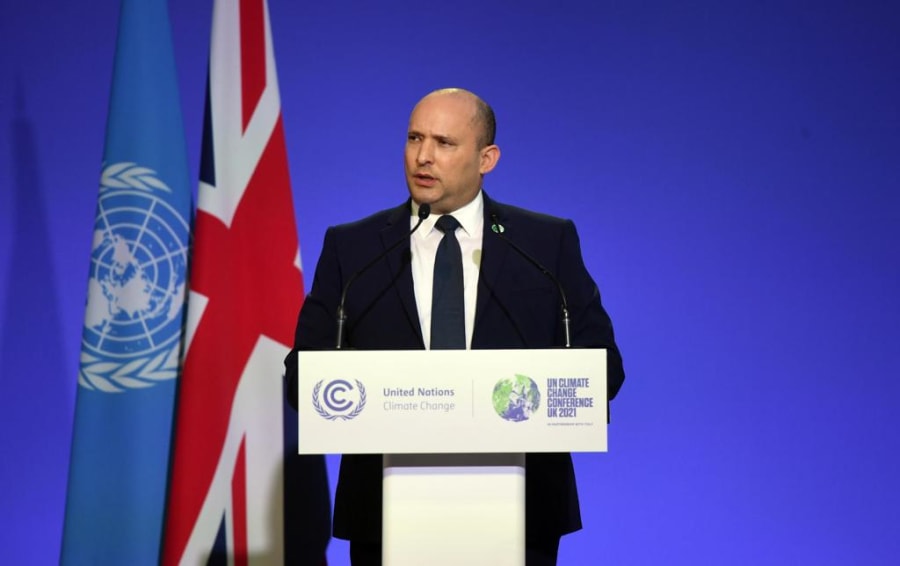Bennett pledges to harness Israeli ingenuity and innovation to 'save the world' from environmental challenges
China, Russia and Turkey are no shows in Scotland. But is Israel getting serious about climate change?

Despite its tiny size, Israel – led by Prime Minister Naftali Bennett – is leading the world’s second largest delegation to the global climate conference in Glasgow, Scotland – a 120-member delegation which includes senior officials such as Environmental Protection Minister Tamar Zandberg and Energy Minister Karin Elharar.
In his address Monday at the United Nations Climate Change Conference of the Parties (COP26), Bennett pledged that Israel – with the most startups per capita in the world – will “channel our efforts to saving the world.”
"Behavioral change alone will only take us so far. We’re going to need new inventions and new technologies that have not yet been even imagined,” Bennett said.
Accordingly, Bennett announced a new task force called The Green Sandbox that will fund entrepreneurs who can harness Israeli business and technology ingenuity and innovation to affect climate change for the best.
U.S. President Joe Biden is present as is Great Britain's Prince Charles who opened the summit.
"We need a vast military-style campaign to marshal the strength of the global private sector, With trillions at its disposal," Charles said. "We have to put ourselves on what might be called a warlike footing.”
But as many world leaders gathered in Glasgow yesterday, there were a few noticeable absences. Turkey's President Recep Tayyip Erdogan decided not to attend, saying the UK failed to meet the “security protocol standards” that were requested by his government.
“There were security protocol standards that we had demanded for the United Nations Climate Conference in Glasgow. These are standards in protocols that are always applied to us and all leaders in all visits. However, we were told that these will not be met at the last minute,” Erdogan said.
China – considered the world's largest emitter of greenhouse gases – and Russia are also not in attendance. Chinese President Xi Jinping sent a written statement calling on developed nations to take action but made no commitment for his own country.
ISRAEL'S ENVIRONMENTAL CHALLENGES
National security has, understandably, been Israel’s top priority for decades while climate issues have traditionally received a lower priority by Israeli governments.
With this new diverse government which includes environmentalists in the coalition, is the Jewish state now getting serious about climate issue amid alarming reports on potentially serious environmental implications for Israel and the world?
Israel is currently a mixed bag when it comes to the environment. On one hand, the country is exports cutting-edge green technologies. On the other hand, Israel is over-polluting and remains unprepared for climate change challenges, according to a recent stinting report by the State Comptroller.
Despite the impressive delegation size and a changed rhetoric by Israeli government officials, Israel lags behind most of the Western nations in terms of environmental awareness. Extensive littering has been one of these issues. For instance, Tel Aviv beaches were ranked third in plastic pollution in the Mediterranean region, according to a World Wildlife Fund report from 2019. On average, the Tel Aviv region recorded 21 kilograms (46 pounds) of plastic debris per kilometer (.6 miles) of coastline whereas the crowded French Marseilles region only recorded 9.4 kilograms (20 pounds) of plastic debris per kilometer.
While the Start-Up nation leads the world in water recycling, it is near the bottom among advanced OECD countries in terms of recycled waste. Germany recycled 65% and South Korea recycled 59% of their respective municipal waste compared to Israel which merely recycled 19%.
And despite its small size, the Jewish state also has high CO2 emissions per capita, compared to advanced green countries such as Germany, Sweden, Denmark and Austria.
Israel has supposedly been warming at a faster rate than the rest of the world, almost twice as fast as the global average, according to a recent report with data collected by the Israel Meteorological Service. The report suggests that the Jewish state has been warming up by an average of 2.1 degrees Celsius since the 1980s compared the global average of 1.18 degrees Celsius.
The report concludes that Israel and its Middle Eastern neighbors, who are located in a high-risk climate region, are currently underperforming in environmental issues compared to most Western nations.
The current Israeli government, with the Environmental Protection Agency under Zandberg and the Energy Ministry under Elharar, is taking strong and rapid action is needed in the area of environment protection.
Bennett and Elharrar announced last week that Israel is pledging zero emissions by 2050, something that a growing number of countries are committing to.
Ahead of his visit to Glasgow, Bennett told journalists that Israel plans to set up a fund to encourage investments in green technologies. Speaking at the climate conference in Scotland on Monday, Bennett said that Israel was at the beginning of a climate change revolution.
“While we meet here today in Glasgow, we know that history will judge the response of our generation to this threat – not by the measure of our ambitions but by the practical steps that we take. Israel is at the start of a revolution on the subject of climate change,” Bennett said.
The Israeli prime minister stressed that Israeli high-tech could play an important role in the global combat against climate change.
“Israel is a small country. We are one third the size of Scotland. Our carbon footprint is maybe small, but our influence on climate change could be mighty," Bennett said. “If we’re going to move the needle, we need to contribute Israel’s most valuable source of energy – the energy and brainpower of our people. This is what fuels our innovation and ingenuity. This is where Israel can make a real difference.”
Time will tell whether the Start-Up nation will eventually become as successful in managing environmental challenges as it has been dealing with security-related technologies, water technology management and rolling out efficient vaccination campaigns.

The All Israel News Staff is a team of journalists in Israel.














